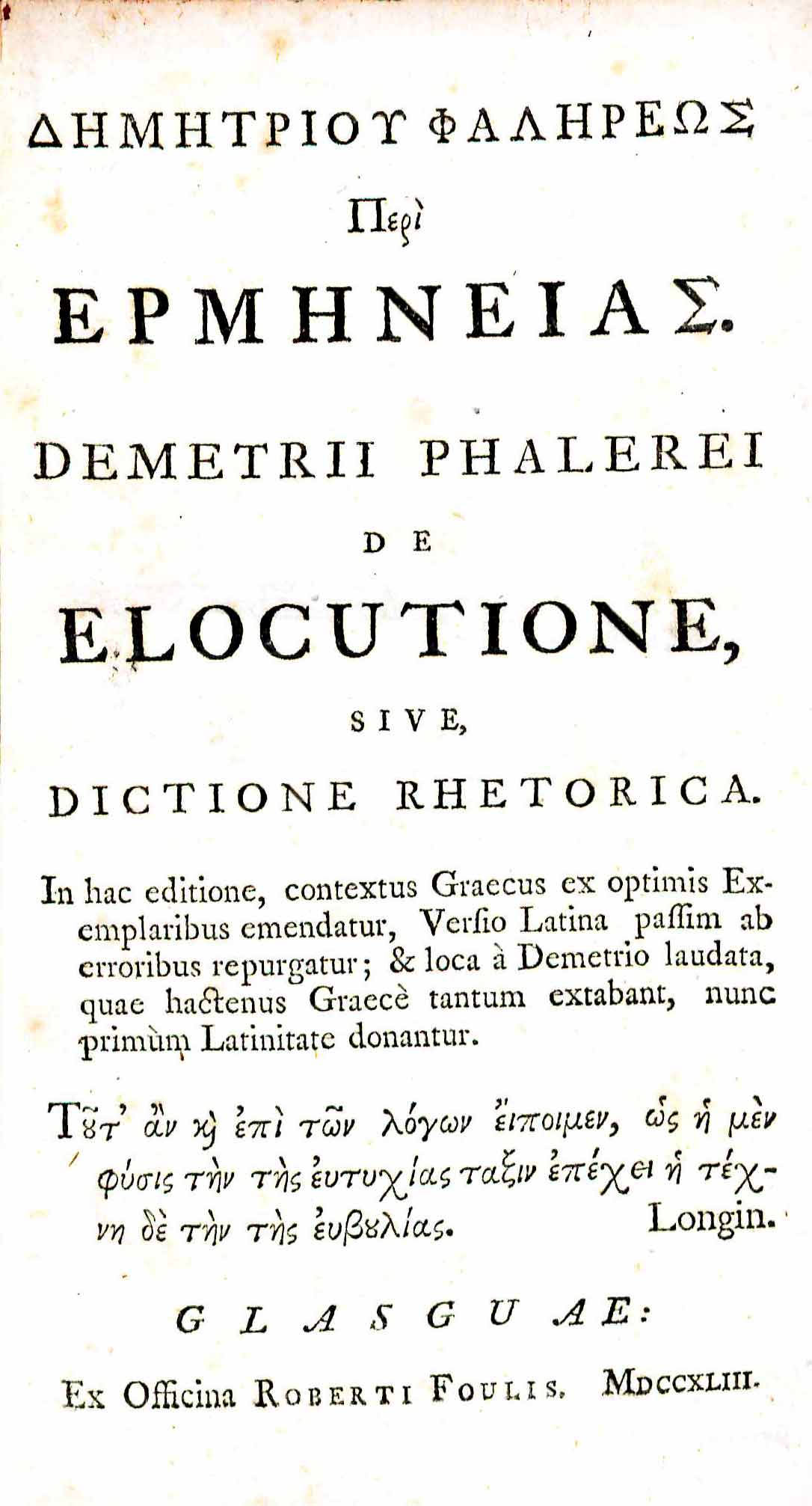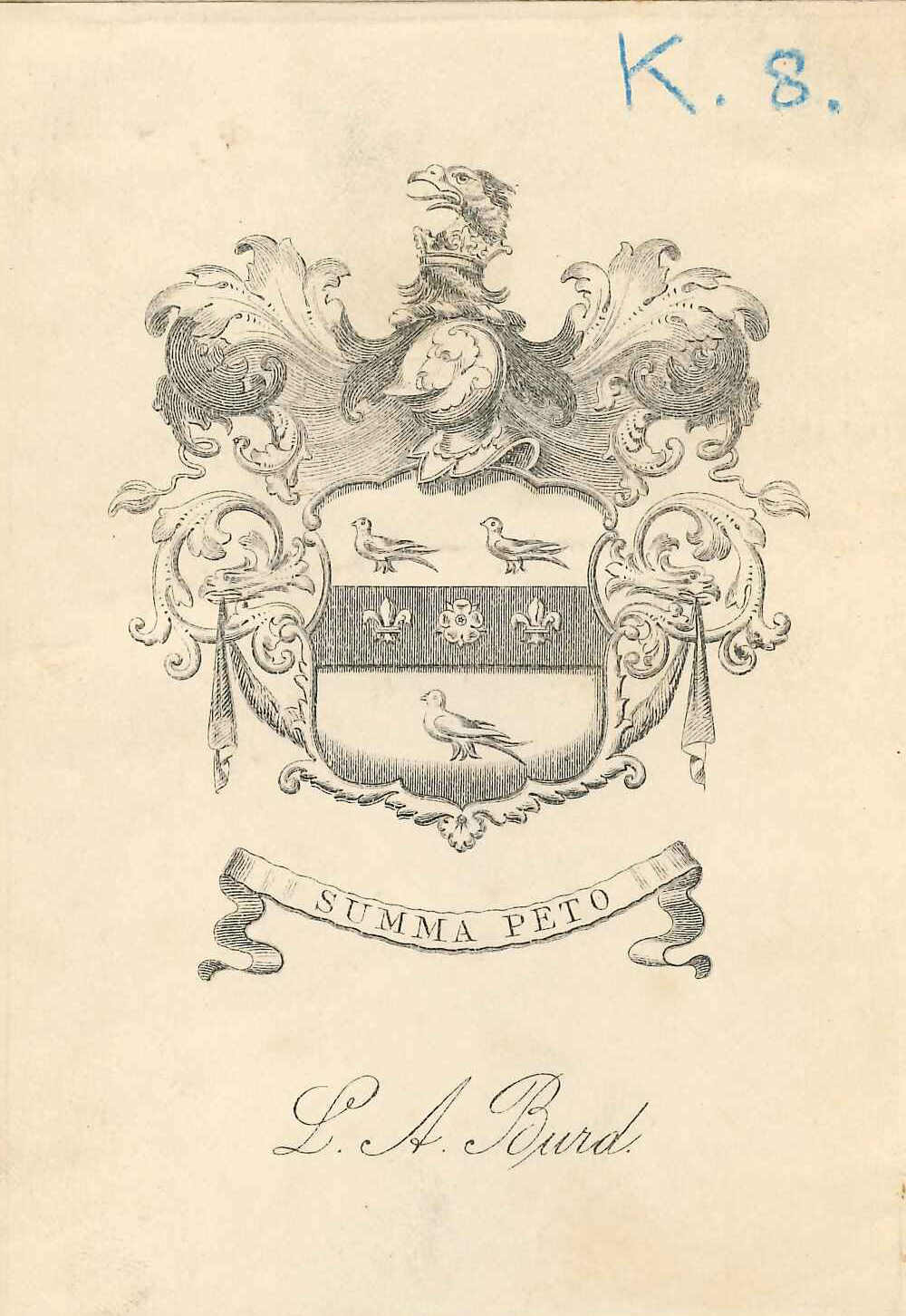Difference between revisions of "Demetriou Phalēreōs Peri Hermēneias"
m (→Evidence for Inclusion in Wythe's Library) |
|||
| (14 intermediate revisions by 9 users not shown) | |||
| Line 1: | Line 1: | ||
| − | {{DISPLAYTITLE: | + | {{DISPLAYTITLE:''Demetriou Phalēreōs Peri Hermēneias = Demetrii Phalerei De Elocutione, Sive Dictione Rhetorica''}} |
| − | |||
===by Demetrius=== | ===by Demetrius=== | ||
__NOTOC__ | __NOTOC__ | ||
{{BookPageInfoBox | {{BookPageInfoBox | ||
|imagename=DemetriusPhalereideElocutione1743.jpg | |imagename=DemetriusPhalereideElocutione1743.jpg | ||
| − | |link=https:// | + | |link=https://wm.primo.exlibrisgroup.com/permalink/01COWM_INST/g9pr7p/alma991026807779703196 |
|shorttitle=Demetriou Phalēreōs Peri Hermēneias | |shorttitle=Demetriou Phalēreōs Peri Hermēneias | ||
| − | |author=Demetrius | + | |author=[[:Category:Demetrius|Demetrius]] |
| − | |lang=Greek and Latin on opposite pages | + | |lang=[[:Category:Greek|Greek]] and [[:Category:Latin|Latin]] on opposite pages |
| − | |publoc=Glasguae | + | |publoc=[[:Category:Glasgow|Glasguae]] |
|publisher=ex officina Roberti Foulis | |publisher=ex officina Roberti Foulis | ||
|year=1743 | |year=1743 | ||
|pages=2 p.l., [3]-197 | |pages=2 p.l., [3]-197 | ||
| − | |desc=8vo (18 cm.) | + | |desc=[[:Category:Octavos|8vo]] (18 cm.) |
| + | |shelf=H-2 | ||
}}{{BookPageBookplate | }}{{BookPageBookplate | ||
|imagename=DemetriouPhalereosPeriHermeneias1743Bookplate.jpg | |imagename=DemetriouPhalereosPeriHermeneias1743Bookplate.jpg | ||
|display=left | |display=left | ||
|caption=Bookplate of L. A. Byrd, front pastedown. | |caption=Bookplate of L. A. Byrd, front pastedown. | ||
| − | }}[ | + | }}[[wikipedia:Demetrius of Phalerum|Demetrius of Phalerum]] (350 – 280 BCE) was an ancient Greek orator and writer. He rose from relative obscurity and humble beginnings to become one of the most prolific and well-known ancient Greek writers. Demetrius was born into a family which had no rank or property,<ref>Claudius Aelian, ''Varia Historia'', ed. Mervin R. Dilts (Leipzig: B.G. Teubner, 1974), 43.</ref> but there is evidence that he was educated in the school of [[wikipedia:Theophrastus|Theophrastus]].<ref>William W. Fortenbaugh, Pamela M. Huby, and A. A. Long, "Theophrastus and the Theory of Style" in ''Theophrastus of Eresus: On His Life and Work'' (New Brunswick, U.S.A.: Transaction Books, 1985), 251.</ref> At the age of twenty-five he began his public career, where he soon acquired a great reputation based on the talent he displayed in public speaking. Demetrius was eventually placed at the head of the administration of Athens.<ref>''Encyclopædia Britannica Online'', s.v. "[http://www.britannica.com/EBchecked/topic/157050/Demetrius-of-Phaleron Demetrius Of Phaleron]," accessed October 24, 2013.</ref> He maintained this position for ten years, during which time he instituted extensive legal reforms.<ref>Ibid.</ref> Demetrius was very popular during his time in Athens, but was criticized by the lower class of Athenians who resented the limitations he put on democracy.<ref>Peter Green, ''Alexander to Actium: the Historical Evolution of the Hellenistic Age'' (Berkeley: University of California Press, 1990), 36.</ref> |
| − | + | ||
| − | Athens was captured in 307 BCE and Demetrius, at age forty-three, was forced to flee the city.<ref>Demetr. Plutarch, ''Dionysius of Halicarnassus'' (New York: Garland Pub., 1987), 3.</ref> Following his flight, his enemies convinced the people of Athens to pass the death sentence upon him.<ref>''Encyclopædia Britannica Online'', s. v. "Demetrius Of Phaleron."</ref> Demetrius traveled to the court of Ptolemy I at Alexandria where he devoted himself to his literary pursuits; most of his literary works were written during his time in Egypt.<ref>Ibid.</ref> His works covered a wide range of topics such as history, philosophy, politics, and poetry.<ref>Ibid.</ref> | + | Athens was captured in 307 BCE and Demetrius, at age forty-three, was forced to flee the city.<ref>Demetr. Plutarch, ''Dionysius of Halicarnassus'' (New York: Garland Pub., 1987), 3.</ref> Following his flight, his enemies convinced the people of Athens to pass the death sentence upon him.<ref>''Encyclopædia Britannica Online'', s.v. "Demetrius Of Phaleron."</ref> Demetrius traveled to the court of [[wikipedia:Ptolemy I|Ptolemy I]] at Alexandria where he devoted himself to his literary pursuits; most of his literary works were written during his time in Egypt.<ref>Ibid.</ref> His works covered a wide range of topics such as history, philosophy, politics, and poetry.<ref>Ibid.</ref> |
==Evidence for Inclusion in Wythe's Library== | ==Evidence for Inclusion in Wythe's Library== | ||
| − | Listed in the [[Jefferson Inventory]] of [[Wythe's Library]] as | + | Listed in the [[Jefferson Inventory]] of [[Wythe's Library]] as "Demetrius Phalereus de elocutione. Gr. Lat. Foulis. 8vo." and kept by [[Thomas Jefferson]]. Jefferson later sold a copy to the Library of Congress.<ref>E. Millicent Sowerby, ''Catalogue of the Library of Thomas Jefferson'', (Washington, D.C.: The Library of Congress, 1952-1959), 5:18 [http://babel.hathitrust.org/cgi/pt?id=mdp.39015033648133;view=1up;seq=30 [no.4654]].</ref> A copy of the 1743, Foulis edition at the Library of Congress is associated with Jefferson, but has no definitive Jefferson or Wythe markings. It does include manuscript notes in Greek. Both the [https://digitalarchive.wm.edu/handle/10288/13433 Brown Bibliography]<ref>Bennie Brown, "The Library of George Wythe of Williamsburg and Richmond," (unpublished manuscript, May, 2012) Microsoft Word file.</ref> and [http://www.librarything.com/profile/GeorgeWythe George Wythe's Library]<ref>''LibraryThing'', s.v. "[http://www.librarything.com/profile/GeorgeWythe Member: George Wythe]," accessed on April 28, 2013.</ref> on LibraryThing suggest that this copy may be the one which once belonged to George Wythe. With such strong evidence at hand, the Wolf Law Library purchased a copy of the 1743 edition. |
==Description of the Wolf Law Library's copy== | ==Description of the Wolf Law Library's copy== | ||
| − | Bound in contemporary calf, rebacked with original gilt-lettered morocco label. Includes the bookplate of L.A. Burd with the Latin motto "Summa peto" (seek the highest) and the initials "K.S." | + | Bound in contemporary calf, rebacked with original gilt-lettered morocco label. Includes the bookplate of L.A. Burd with the Latin motto "Summa peto" (seek the highest) and the initials "K.S." |
| − | + | ||
| − | View this book in [https:// | + | Images of the library's copy of this book are [https://www.flickr.com/photos/wolflawlibrary/albums/72157637876134053 available on Flickr.] View the record for this book in [https://wm.primo.exlibrisgroup.com/permalink/01COWM_INST/g9pr7p/alma991026807779703196 William & Mary's online catalog]. |
| + | |||
| + | ==See also== | ||
| + | *[[George Wythe Room]] | ||
| + | *[[Jefferson Inventory]] | ||
| + | *[[Wythe's Library]] | ||
| + | |||
==References== | ==References== | ||
<references/> | <references/> | ||
| + | [[Category:Demetrius]] | ||
[[Category:George Wythe Collection at William & Mary's Wolf Law Library]] | [[Category:George Wythe Collection at William & Mary's Wolf Law Library]] | ||
| + | [[Category:Jefferson's Books]] | ||
[[Category:Language and Rhetoric]] | [[Category:Language and Rhetoric]] | ||
[[Category:Possible Surviving Wythe Volumes]] | [[Category:Possible Surviving Wythe Volumes]] | ||
[[Category:Titles in Wythe's Library]] | [[Category:Titles in Wythe's Library]] | ||
| + | |||
| + | [[Category:Glasgow]] | ||
| + | [[Category:Greek]] | ||
| + | [[Category:Octavos]] | ||
Latest revision as of 14:58, 21 June 2023
by Demetrius
| Demetriou Phalēreōs Peri Hermēneias | |
|
Title page from Demetriou Phalēreōs Peri Hermēneias, George Wythe Collection, Wolf Law Library, College of William & Mary. | |
| Author | Demetrius |
| Published | Glasguae: ex officina Roberti Foulis |
| Date | 1743 |
| Language | Greek and Latin on opposite pages |
| Pages | 2 p.l., [3]-197 |
| Desc. | 8vo (18 cm.) |
| Location | Shelf H-2 |
Demetrius of Phalerum (350 – 280 BCE) was an ancient Greek orator and writer. He rose from relative obscurity and humble beginnings to become one of the most prolific and well-known ancient Greek writers. Demetrius was born into a family which had no rank or property,[1] but there is evidence that he was educated in the school of Theophrastus.[2] At the age of twenty-five he began his public career, where he soon acquired a great reputation based on the talent he displayed in public speaking. Demetrius was eventually placed at the head of the administration of Athens.[3] He maintained this position for ten years, during which time he instituted extensive legal reforms.[4] Demetrius was very popular during his time in Athens, but was criticized by the lower class of Athenians who resented the limitations he put on democracy.[5]
Athens was captured in 307 BCE and Demetrius, at age forty-three, was forced to flee the city.[6] Following his flight, his enemies convinced the people of Athens to pass the death sentence upon him.[7] Demetrius traveled to the court of Ptolemy I at Alexandria where he devoted himself to his literary pursuits; most of his literary works were written during his time in Egypt.[8] His works covered a wide range of topics such as history, philosophy, politics, and poetry.[9]
Evidence for Inclusion in Wythe's Library
Listed in the Jefferson Inventory of Wythe's Library as "Demetrius Phalereus de elocutione. Gr. Lat. Foulis. 8vo." and kept by Thomas Jefferson. Jefferson later sold a copy to the Library of Congress.[10] A copy of the 1743, Foulis edition at the Library of Congress is associated with Jefferson, but has no definitive Jefferson or Wythe markings. It does include manuscript notes in Greek. Both the Brown Bibliography[11] and George Wythe's Library[12] on LibraryThing suggest that this copy may be the one which once belonged to George Wythe. With such strong evidence at hand, the Wolf Law Library purchased a copy of the 1743 edition.
Description of the Wolf Law Library's copy
Bound in contemporary calf, rebacked with original gilt-lettered morocco label. Includes the bookplate of L.A. Burd with the Latin motto "Summa peto" (seek the highest) and the initials "K.S."
Images of the library's copy of this book are available on Flickr. View the record for this book in William & Mary's online catalog.
See also
References
- ↑ Claudius Aelian, Varia Historia, ed. Mervin R. Dilts (Leipzig: B.G. Teubner, 1974), 43.
- ↑ William W. Fortenbaugh, Pamela M. Huby, and A. A. Long, "Theophrastus and the Theory of Style" in Theophrastus of Eresus: On His Life and Work (New Brunswick, U.S.A.: Transaction Books, 1985), 251.
- ↑ Encyclopædia Britannica Online, s.v. "Demetrius Of Phaleron," accessed October 24, 2013.
- ↑ Ibid.
- ↑ Peter Green, Alexander to Actium: the Historical Evolution of the Hellenistic Age (Berkeley: University of California Press, 1990), 36.
- ↑ Demetr. Plutarch, Dionysius of Halicarnassus (New York: Garland Pub., 1987), 3.
- ↑ Encyclopædia Britannica Online, s.v. "Demetrius Of Phaleron."
- ↑ Ibid.
- ↑ Ibid.
- ↑ E. Millicent Sowerby, Catalogue of the Library of Thomas Jefferson, (Washington, D.C.: The Library of Congress, 1952-1959), 5:18 [no.4654].
- ↑ Bennie Brown, "The Library of George Wythe of Williamsburg and Richmond," (unpublished manuscript, May, 2012) Microsoft Word file.
- ↑ LibraryThing, s.v. "Member: George Wythe," accessed on April 28, 2013.

